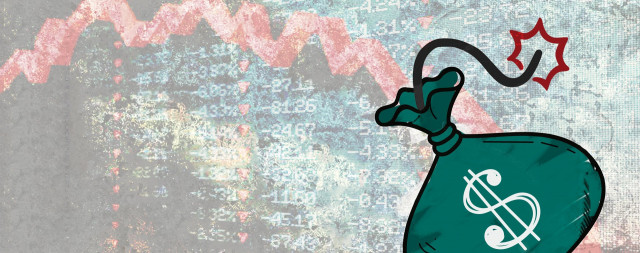Dear stakeholders, don’t push economy off the cliff
Rulers are found blaming opposition and external factors, instead of looking at their self-centred policies

Even from Pakistan’s standard, the outgoing year was a nightmare. Marred with domestic political uncertainty – compounded by a spike in energy prices and global interest rates hike – followed by pertinent delays in enacting the International Monetary Fund (IMF)-guided structural reforms, year 2022 was as challenging as challenges can be. Nevertheless, it’s time to look to solutions instead of restricting ourselves to perennial identifications of problems only.
Let’s begin with the IMF.
Current, and preceding, policy makers should own up to their mistakes in failing to devise a framework for growth. Invariably, our rulers are found blaming the opposition, and external factors, instead of looking inwards at their self-centred policies. In pursuit, we overlook the impact, pain, hopelessness and dismay of nearly 219million people - excluding the 1million rich – banking on a savior to fix the system. It’s been a long wait. As spectators, we have seen regional economies progress spectacularly. Our primary issue is delayed action.
Firstly, inadvertent – deliberate or otherwise – delays in the resumption of the IMF review have depleted our foreign exchange (FX) reserves to an alarming, near default, scenario. Hence, the import of raw material, machinery and tax-yielding consumer goods have grinded to halt. Consequently, scores of industries have laid off thousands of employees sparking social unrest, depletion of purchasing power and a cascading impact of already feeble global competitiveness.
Secondly, the energy sector mess needs to be fixed. An admission of failure is a prerequisite to structural reforms. Pakistan has to be bold enough to recover the entire cost from the rich or the poor. Period. Industries need to be stopped from cross subsidising theft, line losses and low recovery. Job creations for the middle and lower class is the responsibility of the elite who need to have level playing field, consistent policies and competitive factors of production; land, labour, machinery, finance, security and tariffs.
Thirdly, constant ignorance to the alarms being raised by global credit rating agencies require aggressive rebuilding of the economy instead of ‘befitting’ responses. Lenders need to be comforted that the show is going on and, when it comes to matters related to the economic security of the country, unanimous decisions are being taken. It is elementary to check what it will take to get the country rating up to an investment grade – where lenders consider you loan worthy and lend at cheaper rate – instead of lurking at near default CCC ratings.
As a fourth point, core competencies of the nation need to be identified and capitalised on to grow the exports of goods and services. Pakistan’s economic demographic can easily be broken into 1-2 siblings carrying the burden of 10-12 dependents. Hence, the bread earners – exports and remittances – need to be constantly earning enough, and more, to be able to feed, educate and provide healthy lifestyles to their dependents. Little or no tangible action is being taken to enhance our exportable skill-set, as we lack a globally competitive educational landscape.
Import rationalisation is vital in the medium to long term. One needs to extrapolate requirements 20 years from today. If we don’t act soon, we will be feeding 350-400million odd people through imports, leaving little to no scope for a capital intensive, value-adding and high skilled economy. If all our tax receipts are diverted to pay for salaries, pensions, defence and the interest costs of the government, there will be no space left for development. That, too, is a problem that can be intelligently tackled if a public-private partnership is effectively established in the health, education, exports and infrastructure sectors. However, our dear politicians will be bereft of any “development” funds to buy votes or showcase ribbon cutting events for electioneering or recover their campaign expense.
Lastly, we need to extract fair taxes from the property/real-estate sector. At a less than 9% tax-to-GDP rate, we will never be able to create a sustainable, circular and prosperous economy, and thus, radical reforms are needed to widen the tax net and plug the holes. Start with doubling the tax on real-estate moguls buying scores of properties to inflate prices. Yes, it might slow speculation, but affordability will spur construction and create an industry of its own.
Pakistan needs to introduce a fairer, more competitive and penalising economic model. Cities and provinces doing well need to be encouraged to continue doing so and the rich paying their fair share of tax need to be appreciated so further jobs can be created. Public sector employees and tax cheats need to be penalised – regardless of their connections. Putting differences aside, we must admit that (some of) Dar’s apprehensions are correct; the devaluing of the currency spirals into inflation, interest rate hikes, budget deficits, power tariff hikes and increases the need to impose taxes higher than the inflationary rate. Either way, there is a fire in the house and maturity should be exhibited by all stake holders. Don’t push the economy off the cliff.
The writer is an independent economic analyst
Published in The Express Tribune, January 16th, 2023.
Like Business on Facebook, follow @TribuneBiz on Twitter to stay informed and join in the conversation.



















COMMENTS
Comments are moderated and generally will be posted if they are on-topic and not abusive.
For more information, please see our Comments FAQ